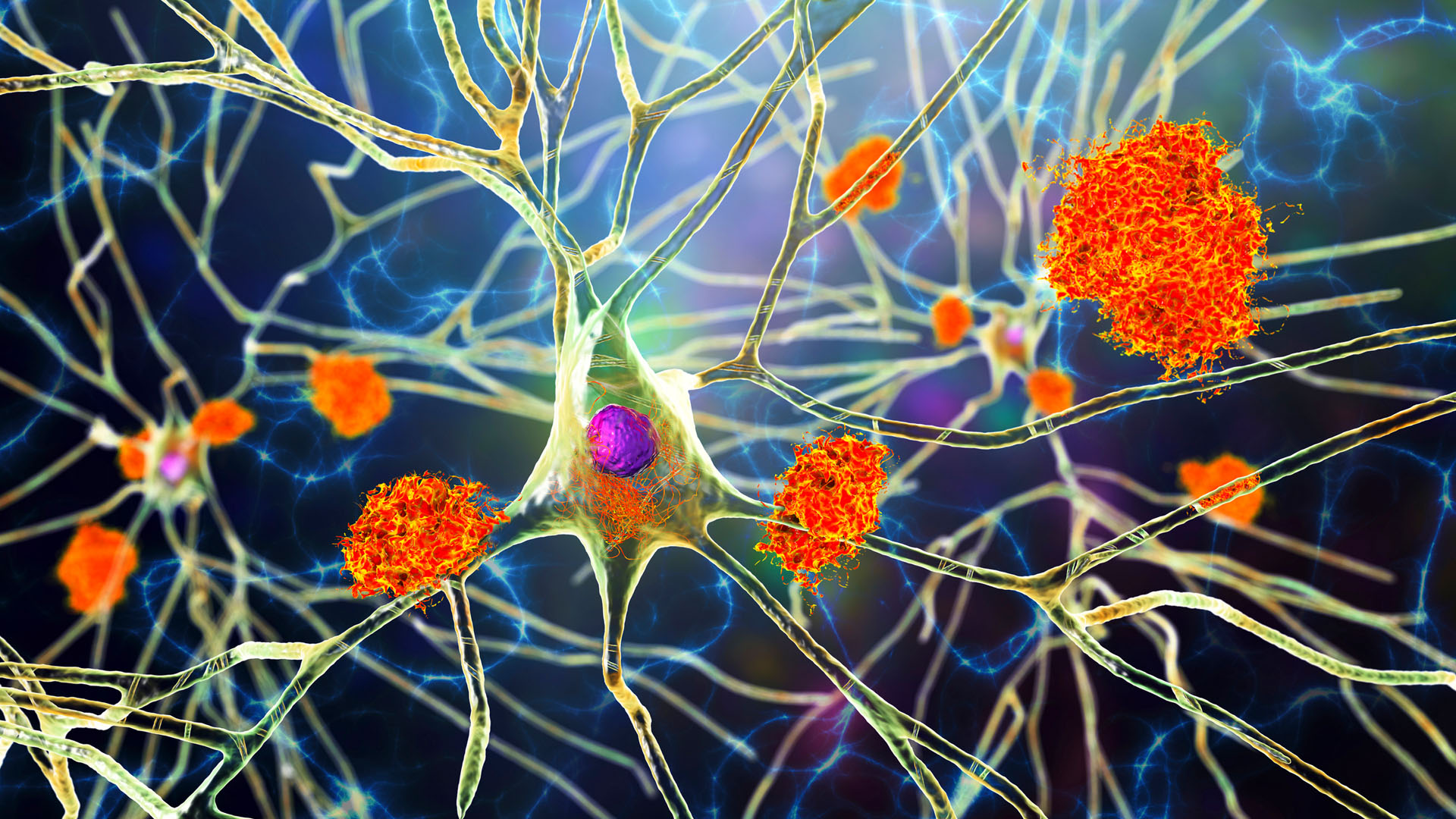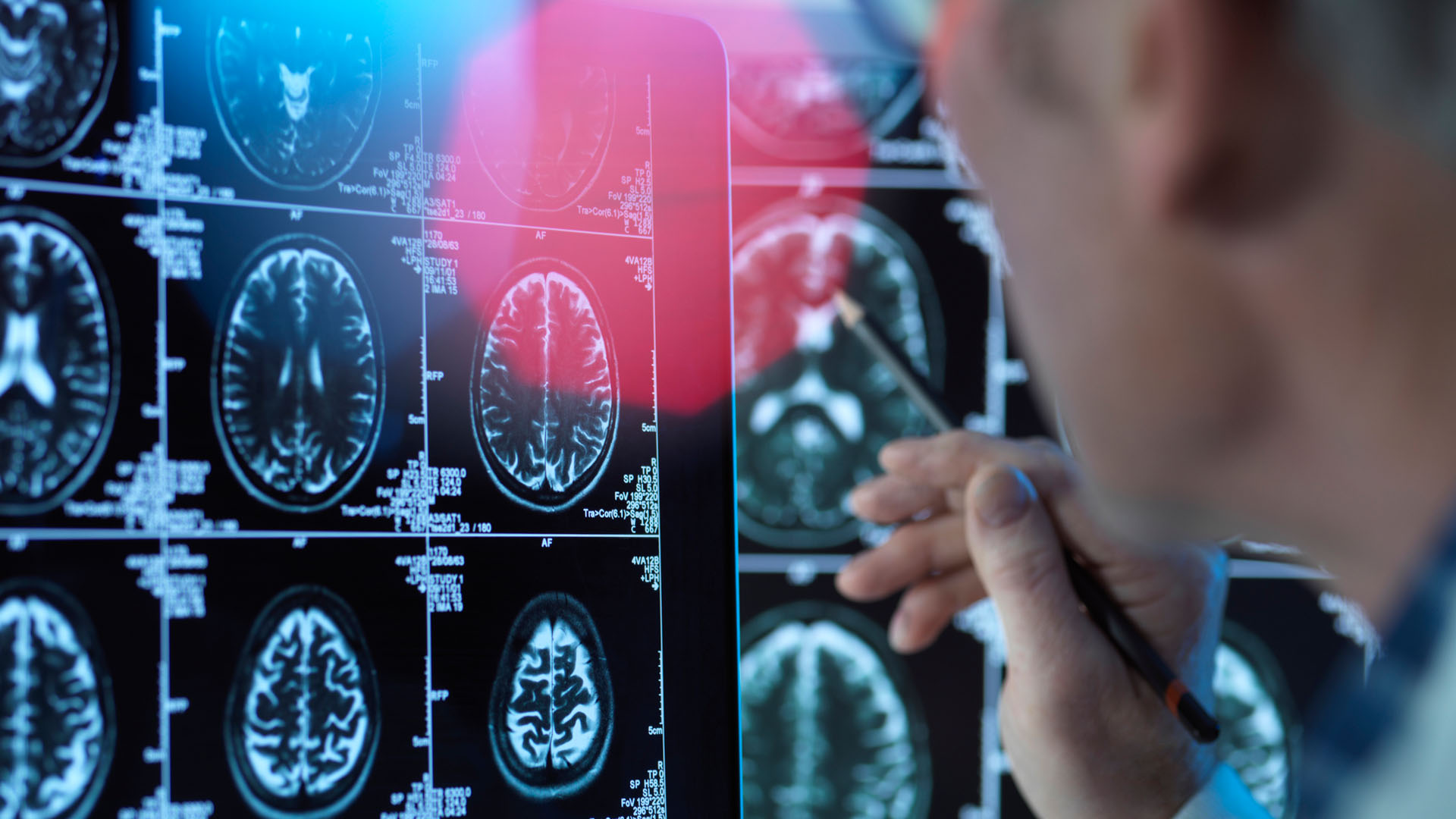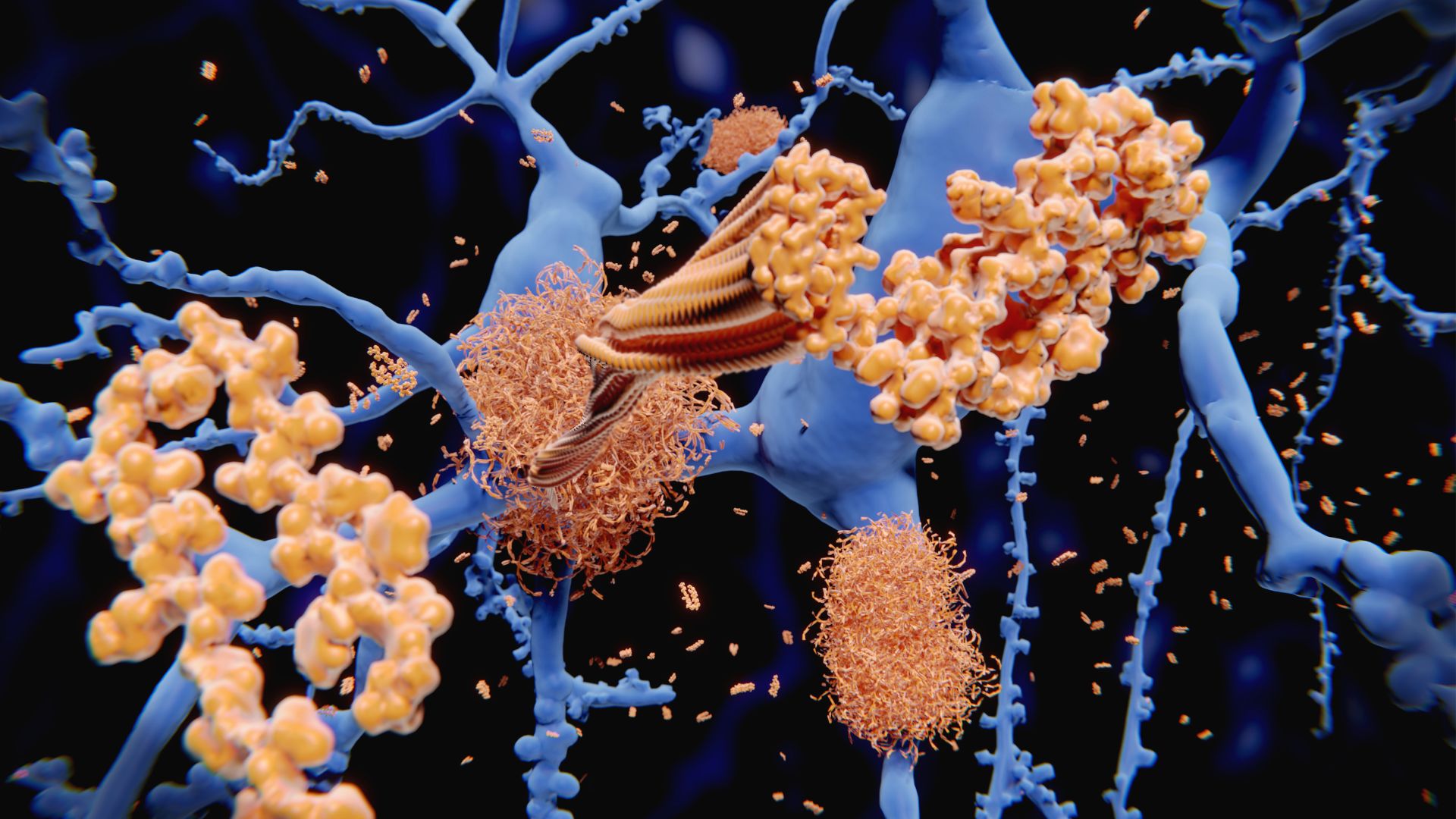Alzheimer's disease: Brain changes, symptoms and treatment
Alzheimer's disease is the most common form of dementia that causes memory and thinking problems, as well as behavioral changes, in adults.

Alzheimer's disease is a progressive brain disorder and a form of dementia that impacts memory, thinking and behavior. As symptoms grow more severe, the disease can seriously affect a person's ability to perform tasks that would otherwise be deemed routine. There is currently no cure for Alzheimer's, but there are medications available that can temporarily delay symptoms.
"Cognitive decline is the first clinical sign [of Alzheimer's]," said Elizabeth J. Coulson, a professor of neuroscience at the Queensland Brain Institute, Clem Jones Centre for Ageing Dementia Research at University of Queensland in Australia. "There are degenerative changes that cause cognitive impairment," she told Live Science. "One of the earliest degenerations occurs in the cholinergic neurons of the basal forebrain, which control attention and higher order cognition, and then the entorhinal cortex and hippocampus, which controls memory."
Around six million Americans are currently living with Alzheimer's, according to the Alzheimer's Association. By 2050, that figure is estimated to be closer to 13 million. Alzheimer's is a disease that prominently impacts older people, with 73% of patients age 75 or older. It is also more common in women, with two-thirds of Alzheimer's patients in the U.S. being women.
Brain changes and Alzheimer's disease
The first case of Alzheimer's was described in 1906 by Dr. Alois Alzheimer, a German neurologist. Alzheimer identified two of the disease's key physical traits when he examined a woman's brain tissue under a microscope after her death: He found abnormal protein clumps (now known as amyloid plaques) and tangled bundles of nerve fibers (now called neurofibrillary, or tau, tangles).
However, while many people argue that the amyloid plaques are the cause of the disease, others say they are just a biomarker for the disease showing that other physiological processes are wrong and they (the latter) cause the disease, Carson said.
"Recent FDA-approved drugs act to get rid of the beta-amyloid in the brain," she said. "They do this very well, but the cognitive processes are not improved — only a tiny bit less decline than someone without the drug."
Dr. Bradley Hyman, a neurologist and director of the Massachusetts Disease Research Center at Massachusetts General Hospital in Boston, also said that nerve bundles can build up inside nerve cells, and along with increased numbers of plaques, can block communication between nerve cells.
Get the world’s most fascinating discoveries delivered straight to your inbox.

Dr. Bradley Hyman directs the Alzheimer’s disease research unit at the MassGeneral Institute for Neurodegenerative Disease (MIND) with the goal of understanding the neuropathophysiologic and genetic factors that underlie dementia. His laboratory studies the anatomical and molecular basis of dementia in Alzheimer’s disease, and dementia with Lewy bodies
The continued loss of connections between nerve cells damages them to the point that they can no longer function properly in the parts of the brain affecting memory, and the nerve cells eventually die. As more nerve cells die, parts of the brain that control reasoning, language and thinking skills are also affected, and brain tissue begins to shrink.
Researchers also suspect that inflammation (excessive action of immune cells in the brain) plays an important role in the progression of Alzheimer's and is more than a side-effect of the disease, Hyman said.
What causes Alzheimer's disease?
The cause of Alzheimer's disease is unclear, but researchers suspect the disease is triggered by a combination of genetic, lifestyle and environmental factors that affect the brain over time.
"A small percentage of people get Alzheimer's because they have a specific change in their DNA," Coulson said. "These people tend to get early onset rather than late onset. The changes in the DNA are linked to the production of beta amyloid from a precursor protein. We all make some, but these genes mean they make more than is typical."
Early-onset Alzheimer's affects people in the mid 30s to mid 60s, and some forms may be inherited. But early-onset disease represents less than 10% of all people with the disorder, according to the National Institute on Aging. Late-onset Alzheimer's is the more common form of the disease, and its first symptoms may appear after age 65.
"We don't know [the causes]," Coulson said. "But there are risk factors. Brain injury results in more risk, as does having sleep apnea, poor vascular health, being overweight, and having diabetes."
According to the Mayo Clinic, other risk factors include:
- Family History. People whose parents or siblings have Alzheimer's have a somewhat higher risk of the disease.
- Heredity. Genetic mutations, such as inheriting the apolipoprotein-E gene, can contribute to the development of Alzheimer's. (But genetic mutations account for less than 1% of people with Alzheimer's, according to the Mayo Clinic.)
- Down Syndrome. People with Down Syndrome are more at risk for Alzheimer's because they have three copies of chromosome 21, which can lead to developing more amyloid plaques in the brain.
- Mild cognitive impairment (MCI). People with MCI have more memory problems than normal for their age, but symptoms don't interfere with their lives. MCI can increase the risk of developing Alzheimer's.
- Severe head injuries. Head injuries have been linked with an increased risk of Alzheimer's.
- Low education levels. People with less than a high-school education may be at higher risk for Alzheimer's.
What are the symptoms of Alzheimer's disease?
The brain changes associated with Alzheimer's may begin a decade or more before a person begins experiencing symptoms, said Hyman.
The most common early symptom of Alzheimer's is difficulty remembering newly learned information, such as recent conversations, events or people's names, according to the Alzheimer's Association. But not everyone has memory problems initially, and some people may first develop changes in their behavior, language difficulties or vision problems.
According to the Mayo Clinic, symptoms in people with mild-to-moderate forms of Alzheimer's may include:
- Repeating statements and questions over and over.
- Forgetting conversations, appointments or events, and not remembering them later.
- Routinely misplacing possessions, and frequently putting them in illogical places.
- Getting lost in familiar places.
- Forgetting the names of loved ones and everyday objects.
- Trouble finding the right words to identify objects, expressing thoughts or participating in conversations.
- Having difficulty concentrating and thinking, and managing finances.
- Struggling to do once-routine activities, such as cooking and playing a favorite game, and eventually forgetting how to do basic tasks, such as getting dressed or bathing.

Alzheimer's also causes mood and behavior symptoms, including depression, sleeplessness, distrusting others, hallucinations and delusions, loss of inhibitions, mood swings, wandering and pacing and anger or aggression.
People with advanced-stage Alzheimer's experience a severe loss of brain function and become completely dependent on others for their care. According to the National Institutes of Health, symptoms during this stage may include:
- Weight loss
- Skin infections
- Difficulty swallowing
- Seizures
- Groaning, moaning or grunting
- Increased sleeping
- Lack of bladder and bowel control
How is Alzheimer's disease diagnosed?
According to Alzheimer's Disease International, there are over 100 forms of dementia, with Alzheimer's being the most well-known form. It can, therefore, be difficult to accurately diagnose Alzheimer's.
"Typically, Alzheimer's is diagnosed through cognitive testing or neuropsychological tests," Coulson said. During these tests, doctors will assess memory impairment, as well as various other thinking skills, functional abilities and any behavior changes.
"Sometimes, more robust and specific tests are performed by a memory clinic, which can involve several hours of testing," Coulson said. "Sometimes an MRI brain scan is performed to look for which parts of the brain are degenerating, or a CT scan to look for vascular changes."
In the past few years, positron emission tomography (PET) scans of the brain, which can detect whether plaques or tangles are present, have been used to diagnose or monitor the disease, Hyman said.
However, Coulson said that is not routine, and is only really used for research purposes.

How is Alzheimer's disease treated?
There isn't a cure for Alzheimer's, but there are medications available that treat some of the symptoms of the disease, Hyman said.
Cholinesterase inhibitors are drugs that may help with symptoms such as agitation or depression. These drugs include donepezil (Aricept), galantamine (Razadyne) and rivastigmine (Exelon).
"These drugs manage the function of the nervous system," Coulson said. "They work for a period of time in many people to improve cognition and quality of life, but do not change the course of the disease."
Another medication known as memantine (Namenda) may be used to slow the progression of symptoms in people with moderate to severe Alzheimer's. Some patients may be prescribed antidepressants to control behavioral symptoms.

"In the last 12 months the FDA has approved two drugs targeting amyloid plaques," Coulson said. "They work very well to clear the plaques, but not for improving cognition."
There have been many failed trials of these sorts of drugs, she said. Recently, when given early, there was a statistically significant outcome, but it is unclear whether the benefit is something a person would notice.
"Some argue that these drugs are given too late in the disease," Coulson said. "They might form part of a treatment in the future, but we shall see. I think a cure is still a way away, but I think better treatments are closer."
Experts agree that in addition to medication, lifestyle factors, such as staying physically, mentally and socially active can all help the brain. A diet rich in fruits, vegetables and whole grains, with moderate amounts of fish, poultry and dairy can also be beneficial.
Additional resources:
- Read what the National Institute of Neurological Disorders and Stroke has to say about Alzheimer's disease.
- Learn more about Alzheimer's in this free book from the National Institute on Aging.
- Find out what's on the horizon in Alzheimer's treatment from the Mayo Clinic.
This article is for informational purposes only and is not meant to offer medical advice.
Cari Nierenberg has been writing about health and wellness topics for online news outlets and print publications for more than two decades. Her work has been published by Live Science, The Washington Post, WebMD, Scientific American, among others. She has a Bachelor of Science degree in nutrition from Cornell University and a Master of Science degree in Nutrition and Communication from Boston University.


